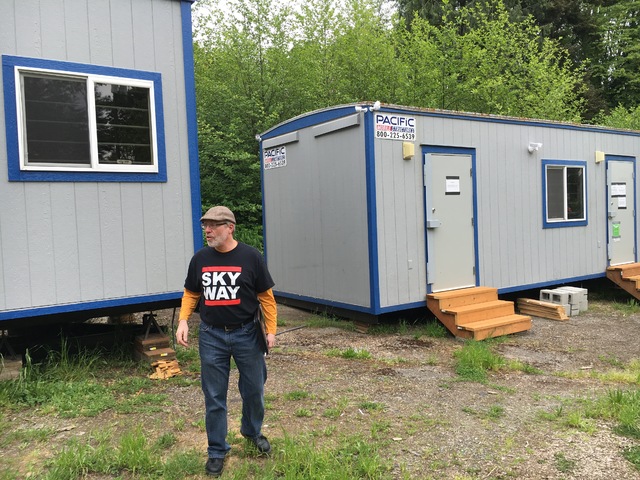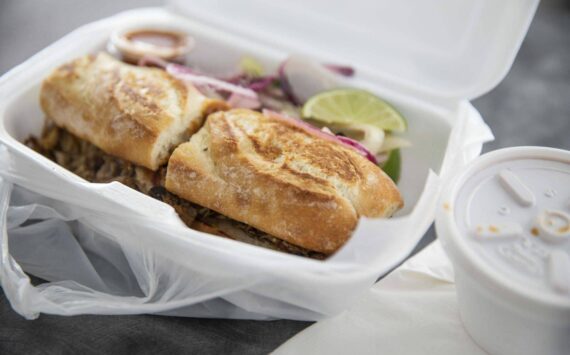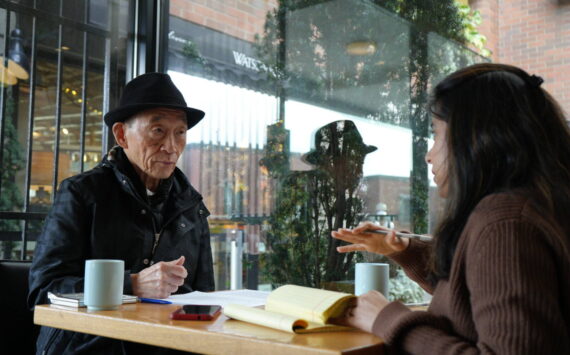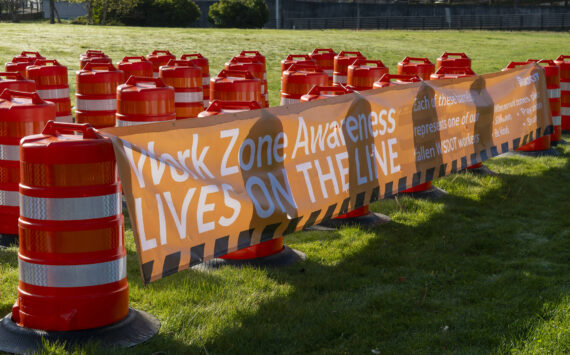To demonstrate what he means by Skyway’s proliferating marijuana industry, Mark Johnston leads a visitor past a ramshackle chainlink fence and down a dirt path to two portable offices up on wood blocks.
The offices, shielded from the din of Martin Luther King Jr. Way by thick foliage, each bear on their doors pieces of paper advising that no firearms or persons under the age of 21 are allowed inside, per state cannabis law. That’s because the trailers represent the proposed sites of two separate recreational marijuana stores. No licenses have been issued, and no pot is being sold from either “storefront,” though ample security cameras are pointed to all corners of the lot. Still, they speak to Johnston’s point: In Skyway, there seems to be pot everywhere. Kitty-corner from the lot is the recreational store Have a Heart, across the street from which a giant billboard points drivers to the store. And directly across the street is III Kings, a subtler 502 shop. Add them up, and you have four pot stores opened or proposed at a single intersection. No wonder the small grocery store next door sells a wide variety of glass pipes.
“This has to be the highest concentration of marijuana stores in the state. If someone could prove me wrong, I’d be interested,” Johnston says.
Johnston moved to this sliver of unincorporated King County, sandwiched between Seattle and Renton, in 2007, and takes pride in its scruffy feel. “It’s the kind of place you can still have your fig trees,” he says, pointing to one particularly bucolic backyard. This day he sports a newsboy cap and a black T-shirt that says SKY-WAY in big white letters. He’s prone to outbursts of laughter that seem almost narcotic, but he’s not a pot-smoker himself. However, he says he voted for I-502, which paved the way for the system that he’s now waging a small battle against on account of what he and some neighbors see as too many pot stores in too small an area.
Johnston’s efforts got an unexpected boost last week when the King County Metropolitan Council placed a moratorium on new marijuana businesses across King County. Still, he says a few days after the Council’s action, it may be too little too late for Skyway.
Today, four stores operate in the general area of Skyway, which stretches from I-5 to Lake Washington, and a fifth is finishing up its building. On the other side of the interstate, in unincorporated White Center, another eight stores have been licensed. Thus, according to Johnston’s count—tentatively confirmed by County Councilmembers—of the 16 retail pot stores given licenses for unincorporated King County so far, 13 of them form a string along Seattle’s southern border.
“It’s like there is a bullseye of convenience painted [on] White Center and Skyway,” says Johnston.
In Washington, licenses have been allocated to cities based on population, with a number of extra “at large” licenses intended to serve populations outside city limits and in small towns. In King County, that translated into 11 “at large” licenses in the first lottery in 2014, and another 11 to accommodate the transition of medical-marijuana stores into 502 stores. But while state law puts restrictions on how close pot shops can be to things like schools and arcades, it says nothing about how close they can be to each other. This seems to have led to a clustering effect in unincorporated areas near Seattle.
“There’s nothing in the law that says anything about a store being within x amount of distance from another store,” says Mikhail Carpenter, a spokesman for the Washington Liquor and Cannabis Control Board.
Carpenter says such issues are best handled by local governments, adding that some cities have actually zoned pot businesses in a way that encourages clustering in order to contain their impact. But Johnston maintains that in Skyway and White Center, the county’s lack of planning has encouraged it. Johnston is white, but argues the shop clusters are a disservice to the area’s large minority populations.
Recently, Johnston has been going to county meetings every month to argue his case. Last Monday he got a shock when Councilmember Reagan Dunn, who represents rural southern King County, introduced the bill for an emergency moratorium on new pot businesses. Somewhat to Johnston’s amazement, the moratorium came in response not to his repeated testimony, but to a community meeting in Ravensdale, in which residents of nearby Maple Valley were concerned that a marijuana-processing business could move in and drive down property prices. The moratorium as introduced involved only processors like the one feared in Maple Valley, but an amendment was added to include recreational stores.
Councilmember Larry Gossett, who is African-American and represents Skyway, introduced the amendment and framed it as a racial issue. In early county discussions about retail marijuana zoning, there were conversations about making the distribution equitable, but “I don’t know if we ever had a discussion about what equity means,” Gossett said prior to the vote to place the county moratorium. “If we’ve already OK’d 15 retail marijuana stores in unincorporated King County and 13 in are two small, working-class neighborhoods, both of which are 50 percent, 60 percent people of color … that doesn’t seem real fair.”
The efforts do have a whiff of Reefer Madness to them. The pot stores in Skyway are, to a shop, clean and as subdued as banks—if a little heavy on the dark-green lighting motifs. Johnston can’t point to anything like a spike in crime or a increase in vagrancy in Skyway as a result of the stores. But as the protests at Uncle Ike’s Pot Shop in the Central District show, the specter of marijuana sales is still prone to elicit strong response, even if it’s not illicit.
As for those trailers in the undeveloped lot, they will not be selling marijuana anytime soon, says Carpenter with the state cannabis board. The board denied their license applications early last month when it realized the storefronts were portable trailers parked in a muddy lot.








